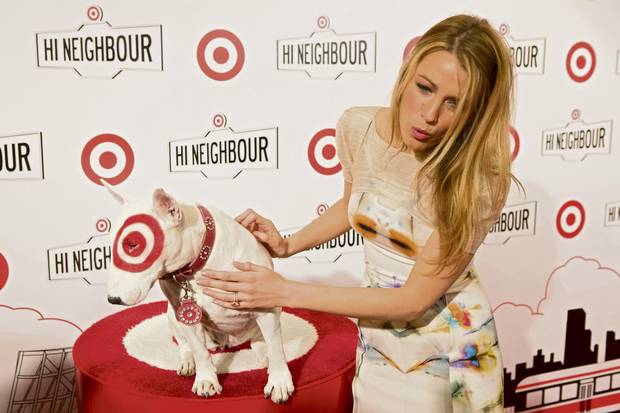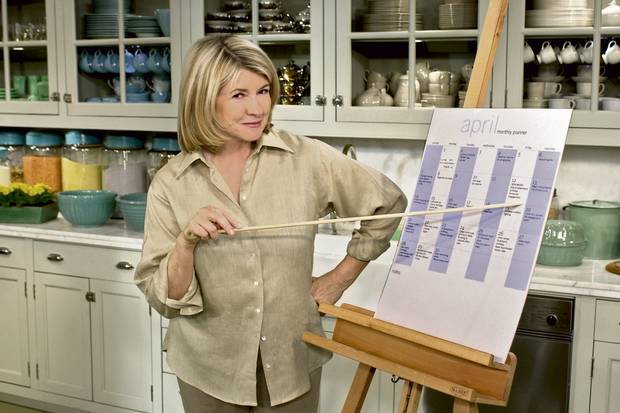Katherine Heigl is "knitting, knitting, knitting" at her Utah ranch. She's making hand warmers (a cuffed half-glove based on a pattern from Purl, the chic yarn store in New York's Soho neighbourhood), colour-dipped scarves and cowl-neck collars that she plans to incorporate into gift crates with a chai-spice scented candle or, perhaps, a set of monogrammed dish towels. We know that Heigl has been feverishly wielding a set of straight needles because the Hollywood actress, best known as Dr. Lizzie Stevens on the longrunning ABC medical drama Grey's Anatomy, wrote about it on Heavenly Days, her new lifestyle blog that launched in early April.
If you follow celebrity gossip, you'll know that Heigl's woolly performance coincides with efforts to resurrect her television career and scrub clean a reputation for being difficult onscreen and off. A former rom-com queen who once commanded $12-million (U.S.) a picture, she's the latest in a long line of actresses who see becoming an arbiter of taste, health and all-around good living as a lucrative path to reinvention. In the photo on her home page, she is perched on a swing in a white lace tea dress and Hunter boots that have yet to step in a muddy puddle; she is simultaneously trying to sell the qualities of aspiration and approachability.
Heigl is by no means the first to attempt this particular second career. Everyone from Jane Fonda to Blake Lively has made forays into selling lifestyles to consumers, and the speed at which these celebrity-branded lifestyle businesses are launching is accelerating. But for every bit of Internet vitriol slung at Heigl's flaxen-haired forebears, people are still buying it. Gwyneth Paltrow's site Goop gets one million unique visitors a month, as reported by Business of Fashion. Lauren Conrad, star of MTV reality shows Laguna Beach and The Hills and founder of her eponymous lifestyle website, has 4.8 million followers on Instagram. The thinking is if these women can be fit, flower-arranging hostesses with the mostest, then we can too. For decades, consumers have had a seemingly unquenchable thirst for this kind of inspiration. For decades they've also hate read these celebrities' advice books, cookbooks and blogs. So why do audiences keep coming back for more?
Gwyneth Paltrow, who earlier this month released her newest book, It's All Easy: Delicious Weekday Recipes for the Super-Busy Home Cook, sketched out the modern celebrity lifestyle-brand blueprint when she founded Goop in 2008. What was first a weekly email newsletter curating high-end style and health fads has since expanded its consciousness-raising mandate into an ever-growing print and online empire pushing fashion collaborations and a luxe organic skincare line. Jessica Alba is another actress who's had success leveraging the lifestyle industry. Her all-natural skincare line, Honest Company, is valued at over $1-billion. Cameron Diaz, who in early April published The Longevity Book, the follow-up to her New York Times No. 1 bestseller The Body, and Kate Hudson – whose athleisure brand Fabletics earlier this year announced it would open 100 stores over the next five years in the U.S. – also preach the benefits of mental, physical and emotional journeys with great success.
Paltrow has reached the heights of a 1990s Martha Stewart – but not everyone can do it. Actress Blake Lively was groomed by Stewart herself, but failed to attain success when she launched her millennial-focused lifestyle hub Preserve in 2014. Lively was lampooned for her website's less-than-polished look and self-promotional tone; it shut down after a year. "It's not making a difference in people's lives," she told Vogue.com during Preserve's exit interview in 2015. Clearly, creating that perfect mix of aspiration and approachability is not as easy as Paltrow makes it look.
Timothy Caulfield, a professor of health law and science policy at the University of Alberta, and author of Is Gwyneth Paltrow Wrong About Everything?: When Celebrity Culture and Science Clash, says that lifestyle brands like Goop and the Honest Company push scientifically contested food and health fads like juice cleanses or going organic as forms of self expression.

Blake Lively failed to attain success when she launched her millennial-focused lifestyle hub Preserve in 2014.
Chris Young
"Even if you don't believe Gwyneth when she talks about organic food, as a source of information, she is emanating a certain lifestyle," he says. "So you begin to associate those choices with that kind of brand, that kind of lifestyle, that kind of look, even if you don't necessarily believe the source."
What's more, aside from not being medical professionals, these celebrities have the means and network to hone a skill set that even advocates of the you-can-have-it-all mindset would balk at. Dr. Lorna Warren, a social scientist at the University of Sheffield, studies the ways in which society and the media understand women and aging. "They present this idea of agency that actually is still really strict," she says. "We can't match these ideals."
Paltrow, of course, isn't the first. Women of a certain age had the same relationship with Jane Fonda in the 1980s that 30– and 40-somethings have with Goop today. "Certainly for women of my generation, we remember [Fonda] as the first woman to stand out for paying attention to the body," says Dr. Warren. "This notion that if you eat well, if you keep fit, if you do these workout routines, you are looking after yourself. There's a degree of truth to that. I think the problem comes when it becomes part of this way of blaming the individual if we don't do that."
A workout empire grew out of Fonda's shape-shifting second– wave feminist "having-it– all" ethos. Goop's success can be traced to Paltrow's seemingly practical and holistic third-wave feminism goal of "living the good life." Both movements were also tied to technological innovation. The home video was in its infancy when Fonda released her tapes, while Paltrow helped to usher in the era of the e-blast. Today social media works in the favour of celebrity lifestyle brands. Heigl has almost 57,000 followers on Pinterest and 1.18 million on Twitter – direct access to prospective readers of her new blog.

Martha Stewart made us care about closet organization and preparing the ‘perfect’ Shaker picnic basket
VANESSA LENZ
Rachel Hills, a New York-based journalist and author of The Sex Myth: The Gap Between Our Fantasies and Reality, is fascinated with the way the web filters the personal branding of celebrities and their followers. "Even though we can't have their lives, what media like Instagram enable people to do is to create the impression of having a similar kind of glamorous life." She finds the most aspirational thing about the Instagram feeds of Paltrow, Conrad and Reese Witherspoon (the actress behind clothing e-tailer Draper James, which opened up its first bricks-and-mortar shop in Nashville in late 2015) is the promotional imagery that comes across as more authentic than real people populating the web with their own recipe hacks and makeup tutorials.
"When Reese Witherspoon posted a picture of her birthday party last week, looking subtle and elegant, casually sitting by candlelight next to Nicole Kidman, it looked like a place I would like to be," says Hills. "I don't actually wish that I was at that table, but I do wish that I was at a table like that, having that experience."
And as long as some of us keep craving those types of experiences – and public figures keep craving another avenue for attention – the lifestyle guru will always have a place at the dinner table.
The gurus
These bossy ladies have attempted to solve all of life's little problems, from how to write letters to burning off post-pregnancy weight
The Grande Dame, Edith Wharton, born Jan . 24, 1862
Expertise Interior decoration. Wharton's first book was the co-authored 1898 manual The Decoration of Houses. She also designed and built the Mount, her Berkshires residence.
Pet Peeve Paying calls. When decorator Elsie de Wolfe wondered why the Gilded Age novelist had a dining table that only sat eight, Wharton responded, "Because there aren't more than eight people in New York I care to dine with."
Best Advice "The fewer the colours used in a room, the more pleasing and restful the result will be."
The Arbiter of Etiquette Emily Post born Oct . 27, 1872
Expertise Simplifying gracious living. The writer meticulously updated her 1922 handbook, Etiquette, twice every decade; she believed etiquette covered both manners and ethics, and should be accessible to women, the middle class and immigrant Americans.
Pet Peeves According to her New York Times obituary, "pretentious people, dirty silver and hostesses who served themselves first."
Best Advice "No one should do anything that can either annoy or offend the sensibilities of others."
The Fitness Fanatic Jane Fonda born Dec . 21, 1937
Expertise "Doing Jane." Beyond inspiring a generation of aerobics instructors to cue, correct form and "feel the burn," Fonda continues to advocate living well in your "third act" with her Prime Time Workout.
Pet Peeve In her 1981 fitness classic, The Jane Fonda Workout Book, the actress railed against "namby-pamby little routines that don't speed up your heartbeat and make you sweat."
Mantra "Discipline is liberation!"
The Doyenne of Domesticity Martha Stew art born Aug . 3, 1941
Expertise DIY domesticity. This super-achiever made us care a lot about closet organization and preparing the "perfect" Shaker picnic basket.
Pet Peeve Junk mail, clothing shopping and Gwyneth Paltrow. "She just needs to be quiet. She's a movie star," Stewart sniped to the New York Post. "If she were confident in her acting, she wouldn't be trying to be Martha Stewart."
Mantra "It's a good thing."
The Lifestyle Leader Gwyneth Paltrow born Sept . 27, 1972
Expertise Clear eyes, glowing skin and a fit body. Through her brand Goop, Paltrow aspires to be the standard-bearer of clean minimalist living.
Pet Peeve Fat, sugar or gluten. Further: microwaves, takeout, and grab 'n' go salads.
Best Advice "It's all a process. 'Falling off' your plan is part of it, not a reason to beat yourself up. It takes time to make these changes. It's all good."
The Southern Belle Blake Lively born Aug . 25, 1987
Expertise Keeping American craftsmanship alive. After an antebellum-obsessed fall fashion post on her website Preserve met with furor, Lively's so-called love affair with the past came to an end.
Pet Peeve Goop. Preserve, referred to as "Goop's moody little sister" by celebrity gossip site The Frisky, never differentiated itself properly from Paltrow's blueprint.
Best Advice "I've asked my assistant to just play Shake It Off on a loop – it feels really good to listen to it on a loop!"
The Reality Star Lauren Conrad born Feb . 1, 1986
Expertise Basic living made pretty. Conrad achieves a relatability with her targeted millennial audience. She sticks with zucchini pizza bites and tuxedo blazers.
Pet Peeve Pompous posters. The former star of The Hills is savvy about her social media – she has 4.8 million Instagram followers – but posts only a few times a day and never lets you forget she was a former magazine intern. Restraint and humility go far.
Best Advice "Life's tough. Get a helmet."